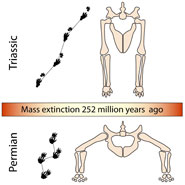A new study has come out that tracks ‘tracks’; i.e., reptile ‘tracks’. It seems that the transition from a straddled to an upright position of reptilian limbs took place almost immediately. So scientists say that have studied fossilized tracks prior to, and immediately after, the end-of-the Permian mass extinction.

[BTW, let’s remember that the Darwinian objection to an absence of intermediate forms is the imperfection of the fossil record, with the difficulty of ‘soft-tissue’ fossilizing as a partial reason. But here we’re talking fossil footracks, which would seem even harder to form, and yet they’re found!]
Professor Mike Benton offers this:
“As it is, the new footprint evidence suggests a more dramatic pattern of replacement, where the sprawling animals that dominated Late Permian ecosystems nearly all died out, and the new groups that evolved after the crisis were upright. Any competitive interactions were compressed into a short period of time.”
Scientists (=evolutionists) were of the assumption that this pre-to-post Permian transition took 20-30 million years. It now appears to have been almost immediate.
Ah, yes, the incredible shrinking timeline for the Cambrian Explosion, the Reptilian Explosion and the Mammalian Explosion (This last one has been coming out over the last year or so, and now we’re seeing the Reptilian Explosion come to the fore). Let’s hear it for Darwinian ‘gradualism’. When will these guys ever give up?!? Behe, in his Edge of Evolution, documents that it has taken 10^16 to 10^20 replication events (progeny) of the eukaryotic malarial parasite for it to come up with a two amino acid change as a way of resisting cholorquinone. Assuming one year/generation for the reptiles, this meant evolutionists before had 20-30 million generations for ‘something’ to happen. And now? Darwinism is hopeless to explain these new discoveries. And, yet, they persist. Scientific faith is a wonderful thing, isn’t it?